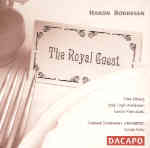Danish composer Hakon Børresen (1876-1954) wrote three symphonies, a violin concerto, ballet music, some chamber works, and an opera or two. Stylistically, he could have lived and worked a half-century before. This opera, just 79 minutes long, is a conversation piece often compared to Richard Strauss’ Capriccio, but the latter is double the length and attempts to take on the “intellectual” issue of whether the words or the music are more important in opera. On the other hand, Børresen’s opera is a nice chamber piece about a staid, stay-at-home couple (Arnold and Emmy) who are expecting company. When the company cancels, they’re surprised to hear sleigh-bells and a knock at the door. A man calling himself Prince Carnival enters and charmingly suggests the couple dress up in their finery and that they have an elegant dinner. Arnold is more open to it than Emmy, but they agree. Prince Carnival adorns the dining room with candles, fruit, and flowers while the couple is dressing for dinner. He’s a good conversationalist and they have a fine old time. The guest flirts with Emmy, speaking poetically and praising Pan, Eros, and mirth. Soon Arnold takes offense and politely asks Carnival to leave. Alone, the couple argue, becoming again the uptight duo they’ve been for years. But they stop arguing when they realize that allowing chance and excitement and some fervor into their lives is a good idea, and they walk off, arm-in-arm, to the bedroom, as their busybody maid, Ane, looks on, bemused. The servant girl takes a bite from an apple that’s been left on the table as the curtain falls.
The work, one of high Romanticism, is concise, beautifully orchestrated (you’ll be frequently surprised by Børresen’s highlighting of individual instrumental groups), and filled with nice (if un-memorable) melodies. The lush prelude, with its stunning horn writing, is a fine appetite whetter. There’s nary a dissonance to be found, and the orchestra does what instruments have been doing for a couple hundred years. Arnold has what could pass for an aria in the second scene, and the music often breaks into arioso, if not quite toe-tapping tunes.
While the work is a bit of a puzzle, it never bores. (I’ll say nothing here about Capriccio.) It was a great success during Børresen’s lifetime and its refusal to intrude too emotionally on the listener while subtly making its points is a plus–and typically Scandinavian. Both leads are well-known Danish singers: Tina Kiberg was a fine Marschallin and Isolde and Stig Andersen is a Tristan and Otello of note. Both have been singing for more than 20 years, and while the bloom is off the rose (Andersen can be a bit scratchy), they’re impressive, involved, and characterful. Guido Paevatalu apparently is an all-purpose baritone (Posa, Guglielmo, Germont, Figaro) and he does well by the Guest, singing with gusto and seductive tone. Ane, a character part, is honked by Edith Guillaume, a sometime Octavian and Poppea. This is a charming work, probably better than it seems at first. In all, this is a fine recording, complemented by a full libretto, translation, and notes.
































